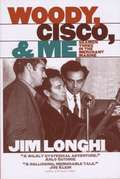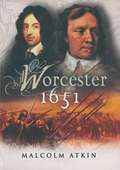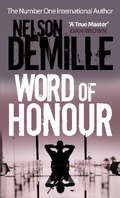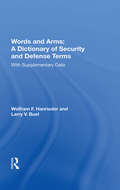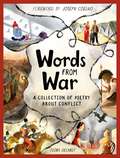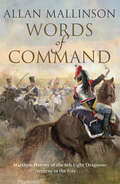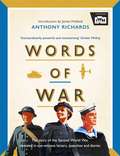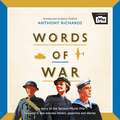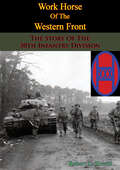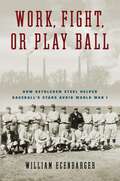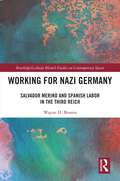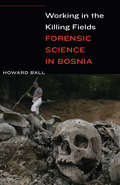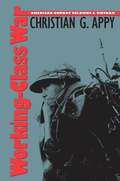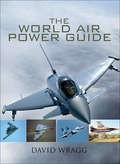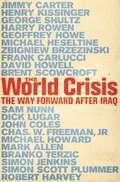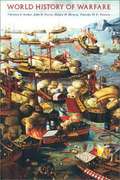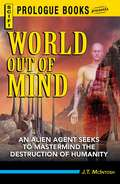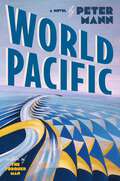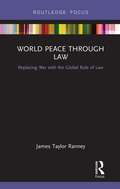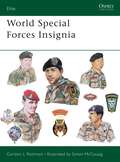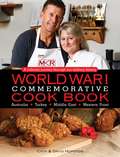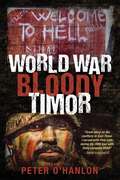- Table View
- List View
Woody, Cisco, and Me: Seamen Three in the Merchant Marine
by Jim LonghiIn his 1997 memoir, Jim Longhi, who passed away on November 22, 2006, gives the reader a first-hand account of Woody Guthrie and Cisco Houston during those crucial years with anecdotes that no other living person could tell; his action-packed account of their ship's dangerous journeys through mine-infested waters, his memories of their ships being torpedoed, his description of their shore leaves throughout North Africa, Italy, Scotland, England and France, his hilarious "on-board" stories of Woody as the ship's dishwasher, menu artist, totem builder, and impromptu entertainer for the troops. Here we have yet another side of Woody, described as only Jimmy could. Jimmy's more personal observations of Woody as a "bunk-mate" and friend are perhaps even more revealing. He describes one incident where Woody saved his life after a torpedo hit their ship. He also tells us of the day after Woody's four year-old daughter Cathy died in a house fire and Woody's response. The memories go on and on... His writing is so eloquent and descriptive one can't help but think... "what a great movie this would make!" Jim Longhi, has been a prizefighter, ladies' stocking salesman, merchant seaman, lawyer and politician as well as a playwright. During World War II he and Woody, shipped out in the Merchant Marine. Guthrie taught him to sing, play the guitar, and "to be brave." They entertained troops under fire and were torpedoed twice off Italy and Normandy. After the war, Longhi became a lawyer, representing Brooklyn's rank-and-file longshoremen against the gangsters. With three longshoremen murdered, Longhi became the spokesman for the movement. People from all walks of life came to help, Arthur Miller and Elia Kazan among others. Longhi urged them to make the movie "On the Waterfront" for which Longhi conceived the original idea. Thereafter, Longhi wrote his own play about the waterfront called "Two Fingers of Pride," and gave Steve McQueen his first job. Longhi's second play, "Climb the Greased Pole," was produced in London's Mermaid Theater, starring Sir Bernard Miles. "The Lincoln Mask," which was performed this year off Broadway. His latest play "The Lantern," a play about Lincoln, was just finished.
Worcestor, 1651: English Civil War, September 1651 (Battleground Britain 1642 - 1651 Ser.)
by Malcolm AtkinThe Battle of Worcester on 3 September 1651 was the final decisive engagement of the English Civil Wars. In this fascinating guide, Malcolm Atkin sets out in a graphic and easily understood way the movements of the opposing armies of Cromwell and Charles II as they approached Worcester and gives a detailed and gripping account of the deadly combat that followed. He also describes of the fate of 10,000 Scottish prisoners and retraces the route of Charles II as he made his dramatic escape.
Word Of Honour
by Nelson DeMilleBen Tyson is a good man, a brilliant corporate executive, an honest handsome family man, admired by men and desired by women. But sixteen years ago Ben Tyson was a lieutenant in Vietnam. There, in 1968, the men under his command committed a murderous atrocity - and together swore never to tell the world what they had done. Now the press, army justice and the events he tried to forget have caught up with Ben Tyson. His family, his career and his personal sense of honour hang in the balance.
Words And Arms: With Supplementary Data
by Wolfram F HanriederThis comprehensive dictionary of terms frequently used in discussions of national security and defense policy contains approximately 800 entries on weapons systems, strategy concepts, military organization, and related items. Part 2 presents a more extensive treatment of such concepts as strategic force doctrine and deployment, Soviet and U.S. poli
Words From War
by Joseph CoelhoA powerful and moving collection of poems written by soldiers and civilians who have experienced different conflicts around the world and throughout history. Each poem is followed by a biography of the poet, and their relationship to conflict, as well as the background of the war that is the subject of each poem.Dating back as far as ancient conflicts like the Battle of Troy and taking the reader through to 21st century conflicts, this collection explores shifting tones of patriotism and disillusionment, to finding hope in bleak times.
Words of Command: (The Matthew Hervey Adventures: 12): immerse yourself in this brilliantly crafted military masterpiece (Matthew Hervey #12)
by Allan MallinsonOnce again, THE SUNDAY TIMES BESTSELLING AUTHOR Allan Mallinson captivates readers with an eminently readable piece of historical fiction. If you're a fan of Patrick O'Brian, Bernard Cornwell and CS Forester, you'll love this.'The Matthew Hervey books have a way of getting under your skin...reveals a man who is very much of his time -and one to have beside you when riding into action.' - DAILY MAIL'One for the fans, who will not be disappointed by Mallinson's winning combination of scrupulous research and derring-do...with the French in front and the Russians behind, Hervey's your man.' - THE TIMES'Leaves the reader slavering for the next instalment.' -- ***** Reader review'This is historical fiction at its very best.' -- ***** Reader review'Such a pleasure to read a well written, well edited, well researched, readable piece of historical fiction.' -- ***** Reader review******************************************************************January 1830, and one of the hardest winters in memory...The prime minister, the Iron Duke, is resisting growing calls for parliamentary reform, provoking scenes of violent unrest in the countryside.Against this inflammable backdrop Lieutenant-Colonel Matthew Hervey, recently returned from an assignment in the Balkans, takes command of his regiment, the 6th Light Dragoons. His fears that things might be a little dull are quickly dispelled by the everyday business of vexatious officers, NCOs promotions and incendiarists on the doorstep of the King himself.But it's when the Sixth are sent to Brussels for the fifteenth anniversary celebrations of the battle of Waterloo and find themselves caught up in the Belgian uprising against Dutch rule that the excitement really starts.Will Hervey be able to keep out of the fighting - a war that would lead, nearly a century later, to Britain's involvement in an altogether different war - while safeguarding his country's interests? Not likely!
Words of War: The story of the Second World War revealed in eye-witness letters, speeches and diaries
by Anthony Richards Imperial War Imperial War MuseumDuring the Second World War, across the frontline as well as on the Home Front, millions of people recorded their thoughts of their experiences - whether in letters, their personal diaries or those prosecuting the war giving speeches. Much as Letters of Note celebrated the great letters written through history, so Words of War allows the Imperial War Museum to showcase its incredible array of first-hand material to shine a light on how people journeyed through the 1939-45 conflict.Ten chapters take the reader chronologically through the key moments of the war: from the retreat to Dunkirk to the battle of the Atlantic; the savage fighting in the jungles of the far East to the RAF Bomber Command's campaign in Europe; the discovery of the Nazi's concentration camp system to the war's ultimate conclusion at the Nuremburg trials. One hundred documents are researched and selected by the Imperial War Museum's expert archivists, with commentary from their head Antony Richards explaining the significance of each and placing it in context to the war's progression. Readers will be able to engage and empathise with the writers in a thought-provoking and immediate way.
Words of War: The story of the Second World War revealed in eye-witness letters, speeches and diaries
by Anthony Richards Imperial War Imperial War MuseumDuring the Second World War, across the frontline as well as on the Home Front, millions of people recorded their thoughts of their experiences - whether in letters, their personal diaries or those prosecuting the war giving speeches. Much as Letters of Note celebrated the great letters written through history, so Words of War allows the Imperial War Museum to showcase its incredible array of first-hand material to shine a light on how people journeyed through the 1939-45 conflict.Ten chapters take the reader chronologically through the key moments of the war: from the retreat to Dunkirk to the battle of the Atlantic; the savage fighting in the jungles of the far East to the RAF Bomber Command's campaign in Europe; the discovery of the Nazi's concentration camp system to the war's ultimate conclusion at the Nuremburg trials. One hundred documents are researched and selected by the Imperial War Museum's expert archivists, with commentary from their head Antony Richards explaining the significance of each and placing it in context to the war's progression. Readers will be able to engage and empathise with the writers in a thought-provoking and immediate way.
Words of War: The story of the Second World War revealed in eye-witness letters, speeches and diaries
by Anthony Richards Imperial War Imperial War MuseumThe Imperial War Museum open its world-famous archives to celebrate the letters, diaries and spoken words of those who witnessed the key events of the Second World War.During the Second World War, across the frontline as well as on the Home Front, millions of people recorded their thoughts of their experiences - whether in letters, their personal diaries or those prosecuting the war giving speeches. Much as Letters of Note celebrated the great letters written through history, so Words of War allows the Imperial War Museum to showcase it's incredible array of first-hand material to shine a light on how people journeyed through the 1939-45 conflict.Ten chapters take the listener chronologically through the key moments of the war: from the retreat to Dunkirk to the battle of the Atlantic; the savage fighting in the jungles of the far East to the RAF Bomber Command's campaign in Europe; the discovery of the Nazi's concentration camp system to the war's ultimate conclusion at the Nuremburg trials. One hundred documents are researched and selected by the Imperial War Museum's expert archivists, with commentary from their head Antony Richards explaining the significance of each and placing it in context to the war's progression. Listeners will be able to engage and empathise with the writers in a thought-provoking and immediate way.(P) 2021 Headline Publishing Group Ltd.
Work Horse Of The Western Front; The Story Of The 30th Infantry Division: The Story Of The 30th Infantry Division
by Robert L. HewittIncludes over 25 maps and 50 photos.More than 60 American divisions participated in the defeat of Germany in 1944-45. This is the story of one of the best of them, a division which fought continually from the Normandy beachhead to the banks of the Elbe River in the heart of Germany.Work Horse of the Western Front is as accurate and honest an account as the writer could make it under the circumstances. Waging war is an exacting business undertaken under conditions which make for confusion and "snafu." The writer has taken the facts as he saw them, the bad as well as the good, with the conviction that he would slight the very real achievements of the Division if he attempted to present a saccharine picture of inevitable triumphs. The measure of a great fighting unit is not that it never runs into difficulties but that it minimizes its errors and gains by experience. By these standards, Old Hickory was a great division--as is evidenced by the caliber of the tasks it was called upon to perform.
Work, Fight, or Play Ball: How Bethlehem Steel Helped Baseball's Stars Avoid World War I
by William EcenbargerIn 1918, Bethlehem Steel started the world’s greatest industrial baseball league. Appealing to Major League Baseball players looking to avoid service in the Great War, teams employed “ringers” like Babe Ruth, Rogers Hornsby, and Shoeless Joe Jackson in what became scornfully known as “safe shelter” leagues. In Work, Fight, or Play Ball, William Ecenbarger fondly recounts this little-known story of how dozens of athletes faced professional conflicts and a difficult choice in light of public perceptions and war propaganda. Some players used the steel mill and shipyard leagues to avoid wartime military duty, irking Major League owners, who saw their rosters dwindling. Bethlehem Steel President Charles Schwab (no relation to the financier) saw the league as a means to stave off employee and union organizing. Most fans loudly criticized the ballplayers, but nevertheless showed up to watch the action on the diamond. Ecenbarger traces the 1918 Steel League’s season and compares the fates of the players who defected to industry or continued to play stateside with the travails of the Major Leaguers, such as Christy Mathewson, Ty Cobb, and Grover Cleveland Alexander, who served during the war. Work, Fight, or Play Ball reveals the home field advantage brought on by the war, which allowed companies to profit from Major League players.
Working for Nazi Germany: Salvador Merino and Spanish Labor in the Third Reich (Routledge Studies on Contemporary Spain)
by Wayne H. BowenThis book examines the leadership of Gerardo Salvador Merino, the chief director of the Sindicatos, fascist-controlled unions under the Franco Regime, and his plan to send 100,000 volunteer Spanish workers to Nazi Germany.Despite a degree of charisma and organizational effectiveness, the ambitions of Salvador Merino failed to transform Spain or lift the working classes, and his career ended with the discovery of ties to Freemasonry. Workers who volunteered for Germany to improve their workplace skills, aid the New Order, and support their families instead endured air raids, Nazi racism, and wartime miseries. These failures highlight the Franco Regime’s misplaced hope to be on the winning side of World War II through low-cost affiliation with Nazi Germany. In the end, Spain derived few benefits from its enthusiasm for Hitler, and after the war endured isolation for its earlier aims. Through new sources on both Salvador Merino and the Spaniards in the Third Reich, this book reveals the story of unsuccessful revolutionary intentions, failed collaboration, and the suffering experienced by Spanish workers, including Republican exiles.This volume will be useful to historians and general readers interested in the history of World War II, modern Spain, fascism, and the use of foreign labor in wartime.
Working in the Killing Fields: Forensic Science in Bosnia
by Howard BallWhile the specifics of individual wars vary, they share a common epilogue: the task of finding and identifying the “disappeared.” The Bosnian war of the early 1990s, which destroyed the sovereign state of Yugoslavia, is no exception. In Working in the Killing Fields, Howard Ball focuses on recent developments in the technology of forensic science and on the work of forensic professionals in Bosnia following that conflict. Ball balances the examination of complex features of new forensic technology with insights into the lives of the men and women from around the globe who are tasked with finding and excavating bodies and conducting pathological examinations. Having found the disappeared, however, these same pathologists must then also explain the cause of death to international-court criminal prosecutors and surviving families of the victims. Ball considers the physical dangers these professionals regularly confront while performing their site excavations, as well as the emotional pain, including post-traumatic stress disorder, they contend with while in Bosnia and after they leave the killing fields.Working in the Killing Fields integrates discussion of cutting-edge forensic technology into a wider view of what these searches mean, the damage they do to people, and the healing and good they bring to those in search of answers. Even though the Balkan wars took place two decades ago, the fields where so many men, women, and children died still have gruesome and disturbing stories to tell. Ball puts the spotlight on the forensic professionals tasked with telling that story and on what their work means to them as individuals and to the wider world’s understanding of genocide and war.
Working-Class War
by Christian G. AppyNo one can understand the complete tragedy of the American experience in Vietnam without reading this book. Nothing so underscores the ambivalence and confusion of the American commitment as does the composition of our fighting forces. The rich and the powerful may have supported the war initially, but they contributed little of themselves. That responsibility fell to the poor and the working class of America.--Senator George McGovern "Reminds us of the disturbing truth that some 80 percent of the 2.5 million enlisted men who served in Vietnam--out of 27 million men who reached draft age during the war--came from working-class and impoverished backgrounds. . . . Deals especially well with the apparent paradox that the working-class soldiers' families back home mainly opposed the antiwar movement, and for that matter so with few exceptions did the soldiers themselves.--New York Times Book Review "[Appy's] treatment of the subject makes it clear to his readers--almost as clear as it became for the soldiers in Vietnam--that class remains the tragic dividing wall between Americans.--Boston Globe
World Air Power Guide
by David WraggCompiled by the author of Janes Air Forces of the World, this book is a must for aviation experts.In one volume the reader will find the composition and details of all air elements of a staggering 169 nations air forces and, where they exist, army air, naval air and such paramilitary organizations as the US Coast Guard Service.By definition such a book must be regularly updated and David Wragg has researched his subject right up to the minute. This latest book supersedes the authors early book in the Jane series.
World Crisis: The Way Forward After Iraq
by Geoffrey HoweWith no end to the War on Terror in sight, how do we plan for the future? Many recent books address facets of the "world crisis" of today-international relations, energy, poverty, and, of course, the Iraq War and Middle Eastern reconstruction-but they do not engage with the entire post-Iraq situation faced by the West, nor do they give suggestions for moving forward. The World Crisis, with essays by statesmen and thinkers from Jimmy Carter to Henry Kissinger, is a broad treatment of a massive set of problems. Nineteen "wise men" of immense experience in global politics (Nunn and Lugar, Freeman and Brzezinski, Heseltine and Carlucci, and more) tell us what to do next after the debacles of Western intervention in Iraq and Afghanistan have tested our faith in government. The essays in this book address the war, nuclear non-proliferation, Western dependence on Middle Eastern oil, global warming and the environment, humanitarian crises, inequality of wealth, Israel and Palestine, and emergent powers. The World Crisis is non-partisan; what unites these writers is that their eyes are open. In an election year, when the crucial issue dividing (or is it uniting?) the electorate is Iraq, clear vision is more important than ever.
World History of Warfare
by Christon Archer John Ferris Holger Herwig Timothy TraversThis book is designed as a text-book for introductory college courses in military history. The text covers worldwide military history from ancient times to the present. Its principal theme is an exploration of change and continuity, revolution and tradition, in three thousand years of warfare. The work teaches students and general readers how warfare evolved and how that evolution affected human society, with emphasis on major turning points in the conduct of warfare rather than superficial general history of wars.
World Out of Mind
by J. T. McintoshThe earth is doomed!Only ten people out of every 3,000 will escape aboard space ships to begin a new colony on Mars. For the rest of humanity . . . inevitable destruction.Bill Easson is a conscientious, straightforward guy. But as pilot of one of the ships, he holds the power of life and death in his hands. As the time grows nearer, violent mobs swarm through the streets, and the ten names on Bill’s list change and change again.The authorities only give Bill a 60 percent chance of survival. He knows in his bones he’s got to lengthen the odds.Or die trying.
World Pacific: A Novel
by Peter MannA darkly comic novel of intrigue, adventure, and the perils of self-invention from the author of The Torqued Man, set in San Francisco and the Asian Pacific during the outbreak of the Second World War.In 1939, just as the clouds of war are gathering, Richard Halifax—boys' adventure writer of manly bravado and the breeziest of prose styles—vanishes in the Pacific. Halifax was attempting to sail a Chinese junk from Hong Kong to San Francisco as part of the World’s Fair festivities on Treasure Island. But while his disappearance upends the lives of those left in his wake back home, both his machinations and his letters to his young readers live on.Hildegard Rauch, an émigré painter and the daughter of Germany’s greatest living writer in exile, finds her twin brother in a coma after an attempted suicide. He left a mysterious note that sends her on a search for the truth about her brother’s relationship with Richard Halifax and the dangerous secret he entrusted to the writer before his voyage.Simon Faulk, a British intelligence officer, has been assigned to ferret out Nazi spies in California. He learns of the arrival of a mysterious American agent from across the Pacific, part of a joint German-Japanese operation.Told in the alternating voices of these three characters, set against the growing threat of another world war and a World’s Fair dedicated to peace, World Pacific is a madcap quixotic tale that explores the many forms of shipwreck, exile, betrayal, and the stories we tell ourselves in the fight to stay afloat.
World Peace Through Law: Replacing War with the Global Rule of Law
by James Taylor RanneyThis book deals with the history and future of the concept of ‘world peace through law’ (WPTL), which advocates replacing the use of international force with the global rule of law. WPTL calls for replacing war with the global rule of law by arms reductions, including the abolition of nuclear weapons, global alternative dispute resolution mechanisms, and various enforcement mechanisms. This book sets forth a three-part proposal: 1) arms reductions – primarily the abolition of nuclear weapons, with necessarily concomitant reductions in conventional forces; 2) a four-stage system of global alternative dispute resolution (ADR), utilizing both law and equity; 3) adequate enforcement mechanisms, including a UN Peace Force. The core of this proposal is alternative dispute resolution mechanisms—international ADR. International ADR would consist of a four-stage process of compulsory negotiation, compulsory mediation, compulsory arbitration., and compulsory adjudication by the World Court. The fundamental proposition of this book is that the use of alternatives to war, global ADR, is the ultimate solution to the problem of peace. The full implementation of WPTL will entail a vast array of progressive initiatives on many fronts, including abolition of nuclear weapons, with the global rule of law being the capstone to all of these developments. This book will be of great interest to students of peace studies, arms control, international law, and world politics.
World Special Forces Insignia
by Gordon Rottman Simon MccouaigThere exists among the world's armies a proliferation of special forces groups. Today's smaller armies, especially those of developing nations, demand maximum efficiency in force structure and employment. Mountain, jungle, arctic and desert areas require special purpose units trained, conditioned, and equipped to master these environments. This volume by ex-weapons specialist in the US 7th Special Forces Group, Gordon L. Rottman, details the insignia of a myriad of special forces groups from all parts of the globe, from Portugal's Commando Regiment to the North Yemen 'Al Mithalaat' Brigade, with a wealth of illustrations and photographs, including 12 full page colour plates by Simon McCouaig.
World War 1 Commemorative Cook Book: A Culinary Journey Through Our Military History
by Cath Hopgood Captain David HopgoodMore than just a cookbook! This is a culinary journey through the period when the Anzac legend was born. This cook book showcases the hearty style of cooking evocative of the time, and presents simple, traditional recipes with a modern twist. Featuring a combination of classics like Anzac Biscuits, Turkish Delight and Osso Bucco Potato Pie together with appealing recipes like ‘Roo Tail Stew and Herb Damper and Harissa Spiced Lamb Backstrap Salad, this is a collection of delicious recipes influenced by the era and wartime locations of the Great War. Combined with a brief history of the contributions of the Anzacs, this cook book commemorates and honours our WWI soldiers.
World War Bloody Timor
by Peter O’HanlonWorld War Bloody Timor gives a revealing insight into the extraordinary life of the everyday digger and service in a conflict that was far from ordinary. My name is Peter O&’Hanlon, but everyone in the military, from the lowest digger to the highest officer, has always called me &‘Irish&’. You won't see me, or the service men and women like me, featured in the latest blockbuster, but our service lives include drama, laughs and accounts of deep turmoil that are worth telling. I was a member of the Australian Army for 11 years and during my deployment as part of the INTERFET force, serviced three very impacting tours of East Timor. What was it like, as a 19 year to land at the Dilli Airport in Australia&’s largest deployment since Vietnam? What are the little-known battles and obstacles that cause unseen scars through a deployment? What are the impacts on re-integrating into the civilian community? This is my story, an ordinary soldier; the juicy yarns, the laughs, the battles, the devastating lows, the soaring highs, the blood, sweat and tears we give in service every day. It will make you laugh and may make you cry. It's the cold hard truth about the impact of a different type of war fought by many who deployed to Timor.
